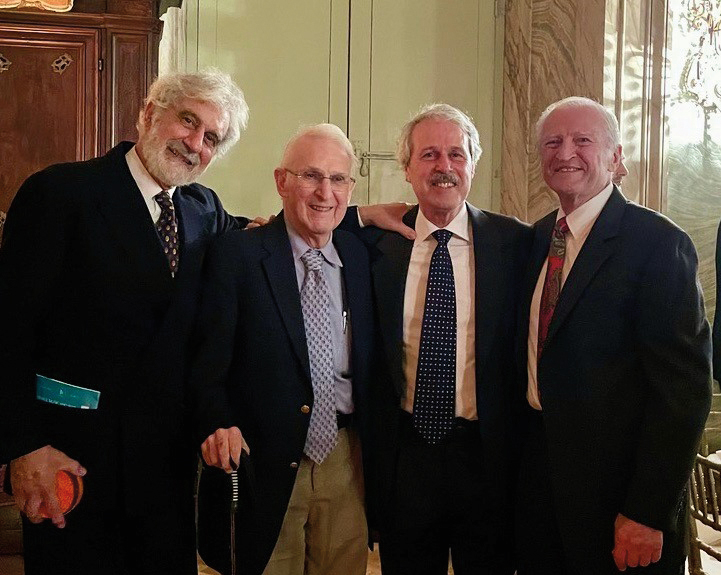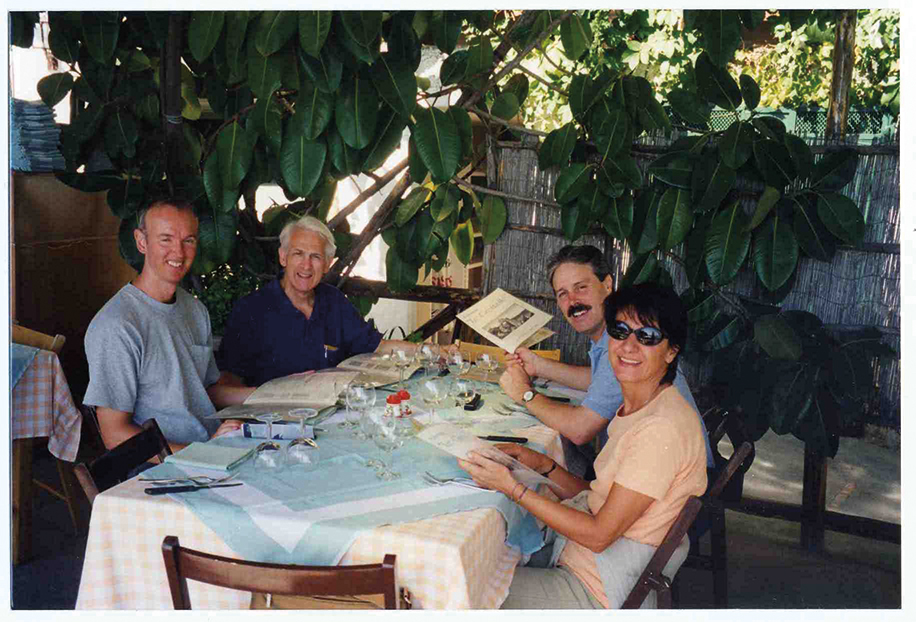Pestilli and Painter
As Trinity celebrates the Rome Campus at 50+ years, a pair’s prominent roles in program’s history are clear
By Andrew J. Concatelli
Roughly 5,500 students hold fond memories of their time at the Trinity College Rome Campus, the College’s oldest global study program. Whether they knew it at the time, their experiences were shaped by the significant contributions of two key figures in the program’s history: Livio Pestilli, former director of the Rome Campus who led the program for nearly four decades, and Borden W. Painter Jr. ’58, H’95, president and professor of history, emeritus, whose steadfast support for the program helped to establish it as a hallmark of the College.
Founded in 1970, the campus celebrated its 50th anniversary this year, three years late due to the COVID-19 pandemic. The March 2023 gathering in Rome included tours, receptions, and panel discussions, including a faculty forum that featured both Pestilli and Painter talking about their longtime involvement with the program.
When Stephen D. Marth* began serving as the director of the Rome Campus and assistant professor of Italian studies in 2017, it was clear to him that the program, which welcomes students from Trinity and from other U.S. colleges, was thriving after being developed and shepherded by Pestilli and Painter. “It’s just an inspiring place to come to. The Rome Campus has a very special feeling to it,” Marth says. “You get a sense of that when you visit the Aventine Hill for the first time. There is a real family feel to the campus that makes it so when people make a connection with this place—either as professors or students—it remains forever as a very intimate and lasting connection.”
‘The Mayor of Rome’

Photo by Wendy Imperial
Born in Italy and raised in the United States, Pestilli was hired in 1978 by the late Michael R. Campo ’48, H’96, John J. McCook Professor of Modern Languages, Emeritus, who founded the Rome Campus. Pestilli first taught Italian language, then art history, and in 1979 became the program’s on-site director—a position he would hold for 37 years until he stepped down in 2016. He remains on the Rome faculty today, teaching courses on Michelangelo and Bernini and sharing his love of travel and of Italy.
“Study-abroad programs widen our horizons,” Pestilli says. “I tell the student it’s the best decision they made. It’s only by going abroad that you will better understand yourself and the world you live in. Going to study abroad is about appreciating how different people and societies approach issues or problems coming from a different angle.
“When studying abroad, many students feel an incredible epiphany,” he continues. “It’s an age of discovery. And add to that experience the beauty, the historical significance of a major western city, along with the art, the food, the weather, and the friends they meet here.”
One such epiphany came to Quanti E. Davis ’93, who was inspired in part by his time studying at the Rome Campus to start a travel management firm. Davis says, “My Rome experience unleashed in me a profound love for travel.” Davis, who now works as a 911 dispatcher, remembers Pestilli’s deep knowledge of all things Italian and his extensive connections in Rome. “It seemed that Livio knew everybody; we called him ‘The Mayor of Rome.’ He had been doing the program so well for so long, and his demeanor was always so calm in any situation,” says Davis.
Pestilli says that he and his colleagues in Rome enjoy sharing their passions with students. “The excitement we transmit to the students in a classroom; on-site; in a church, a museum, or an archeological area strikes a chord with them,” Pestilli says. “I believe the humanities are an enrichment of the human soul. That, to me, is much more valuable, ultimately, for human beings than the more strictly practical experiences that may land more jobs and money.”
Pestilli cites hiring and leading a dedicated staff and faculty among his greatest achievements with the Rome Campus. Ever humble, Pestilli sees himself as something of a caretaker to the program, even after decades leading it. “Michael Campo brought it to life; I helped to nurse it along. Now it’s someone else’s turn,” Pestilli says. “It’s important to take the ego out of the job.”
Marth notes, “Livio was extremely welcoming and available to help me get settled into the new role. He talked to me a lot about the parts of the program that made him the happiest. Most of that was connected with sharing knowledge and passion about Italy, his research with students, and making those connections that have a real impact on people’s lives.”
‘A Spark in his Eyes’
In addition to teaching courses in English and European history, Painter has served as Trinity’s dean of the faculty (1984–87), director of Italian programs (1989–2004), acting president (1994–95), and president (2003–04).
Painter also served as chair of the Cesare Barbieri Endowment for Italian Culture for 15 years and is the author of Mussolini’s Rome: Rebuilding the Eternal City, which continues to be used in courses at the Rome Campus. Since he retired in 2004, he has published books, book reviews, and journal articles.
“I first taught in Rome in the summer of ’71, so I had an association with the program early on,” says Painter, who oversaw the Rome Campus as director of Italian programs. “Thanks to Michael Campo, Trinity gained a university-level reputation in Italian studies because of our program on campus and in Rome. It put us on the map.” Together with Campo, Painter instituted Trinity’s Elderhostel program (now called Road Scholar) in Italy in the early 1980s, providing educational travel programs for adults near or in retirement.

Photo courtesy of the Trinity College Archives
Painter advocated in the 1990s for Pestilli’s director role to expand to full time and to include the summer session. “Livio had the perfect temperament for his job,” Painter says. “He was essentially an American and also a Roman, so we had the best of both worlds.”
Working closely with the Rome program opened a new and unexpected chapter for Painter. “My wife and I got to know the city quite well. In some ways Rome was our second home. When I started teaching at Trinity, I would have never predicted this for my future, so I consider myself very lucky to have been an integral part of this.”
Painter says it’s always gratifying to hear alumni say their time in Rome was life-changing. “Some of them got into art history as a result, some of them continued their study of Italian,” he says. “They remember this as a wonderful time and something they would never forget.”
Ashley Graves Turney ’93, for one, says studying in Rome directly influenced her life. “I fell in love with the city,” she says. “After I graduated, I worked in Italy as a group leader with Elderhostel programs. I got to know Borden and Dr. Campo and his wife. They took me under their wing and showed me around. I now have my own travel company—L’Esperta, meaning ‘The Expert’—that designs trips to Italy. Because of my experience in Rome, I have found a way to keep Italy in my life every day, and I thank Trinity College and the Rome Campus for giving that to me.”
Marth adds that he has learned a lot about the Rome Campus from both Painter and Henry A. DePhillips Jr., Vernon K. Krieble Professor of Chemistry, Emeritus, who brought groups of chemistry students to Rome to learn about art conservation in Rome and has remained very close to the program over the years. “There’s a spark in his eyes when you talk to Borden about Rome,” Marth says. “Borden was and continues to be a huge supporter of the program and has made an enormous contribution toward its success over the years.”
‘New Opportunities’
As Trinity’s Rome Campus is three years into its next 50, Pestilli and Painter reflect on the lasting impacts they made on the program and their hopes for its future.
“I tried to create an environment in which I would love to work,” Pestilli says. “What’s made the program so valuable for so many students is its size and intimacy—we average around 50 students per term—and the fact that we have a staff and faculty who love what they do.
“I hope we don’t forget the things that distinguish us, that the program continues to maintain its high standards, and that it continues to focus on taking advantage of being in Rome, at the sites of ancient civilizations with so much history, literature, and art,” he says. “And as I told Stephen, ‘If you always think of the students first, you will run a good program.’ ”
Painter says he is proud of the work he did with the Rome program and of its ongoing success. “The fact that the program survived things like September 11 and COVID-19 speaks to its continuing strength. It’s not static; it’s adapting and expanding all the time under Stephen’s leadership. There’s a very active internship program now that we didn’t have originally. There are new opportunities for students to work in the city or to live with Italian students,” he says, adding, “The program is a feather in Trinity’s cap. It’s something we can be proud of, and it’s got a very bright future.”
*Stephen Marth left his position with the Trinity College Rome Campus in August 2023.
Remembering Michael R. Campo ’48, H’96
The Trinity College Rome Campus was the vision of Michael R. Campo ’48, H’96, John J. McCook Professor of Modern Languages, Emeritus. A Hartford Public High School graduate, Campo became a Dante scholar and translator of Italian poetry, a longtime Trinity faculty member and chair of the Modern Languages Department (now Language and Culture Studies), and founding director of the Trinity College Rome Campus. After Campo’s death in 2017 at age 93, Painter offered the following words at a memorial service:
“Mike was a visionary, an entrepreneur, and an improviser. In the late 1960s, he talked enthusiastically about starting a Trinity program in Rome. The College had not commissioned him to do so. It was his idea, his vision, and his love of Italian culture that drove him. Lo and behold, the first Rome program began in the summer of 1970. . . . Michael Campo became a Trinity man whose legacy has left a mark on his alma mater and changed, indeed transformed, the lives of so many of us and so many others. I know because he changed my life. I sat in on his intro course in Italian, began teaching modern Italian history, doing research in Italy as I worked in Elderhostel programs. . . . Thank you, Michael, for what you have done for your alma mater and for all of us whose lives were transformed because of you.”
